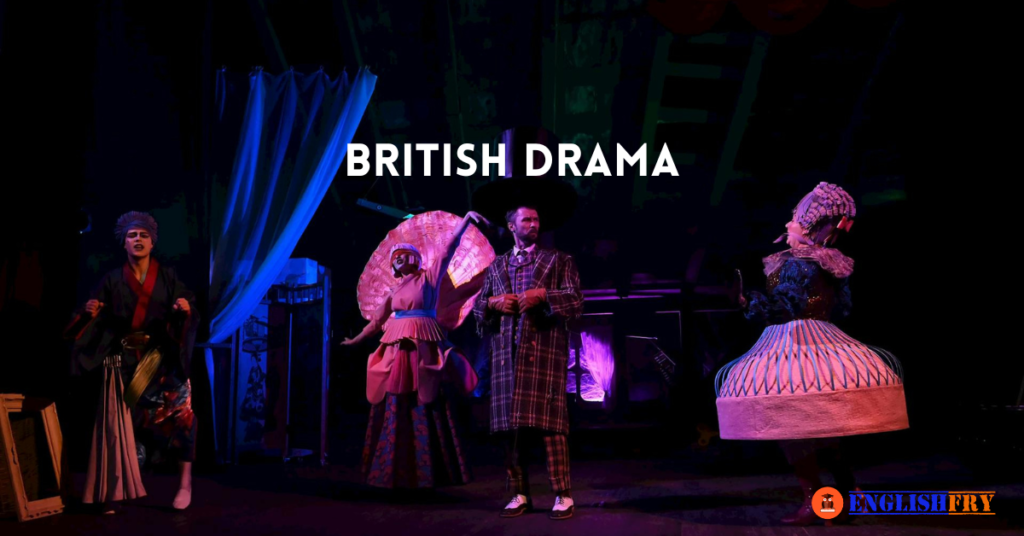British Drama
“All the world’s a stage,
And all the men and women merely players.”
— William Shakespeare, As You Like It
American anthropologist Milton Singer in the mid-twentieth century introduced the term “cultural performance” to designate “particular instances of cultural organization,” i.e., any activity within a culture that renders its image. It includes weddings, musical concerts, festivals, and, most importantly, theatre and drama. While theatre belongs to the performative arts, drama deals with the linguistic-artistic aspect of creativity.
Drama is a significant genre of literature, and the history of drama is the history of human identity. It can be traditionally divided into two categories: comedy and tragedy. Aristotle, in his magnum opus Poetics, defines tragedy as the imitation of serious events in order to achieve catharsis (purification) through actions causing pity and fear. The protagonist, here, meets disaster through hamartia (error) that turns into hubris (pride), while comedy is the imitation of common human failings that generally achieves a happy ending.
However, over a period of a thousand years, this clear demarcation between tragedy and comedy has faded, making way for a number of mixed genres that reflect the age in which these dramas flourished. These include comedy of humours, comedy of manners, miracle and mystery plays, problem plays, theatre of the absurd, and theatre of cruelty, to name a few.
Ancient Drama
Greek Drama
The roots of modern western theatre lie in Greek drama, which developed around the 6th century BCE. Different dramatists from all over Greece participated in a festival held in the city of Dionysia and showcased their plays, the best of which was awarded by the state. However, these early plays evolved out of the chorus.
The elements of Greek drama are listed below:
- The chorus would perform choreographed dances around the altar of Dionysus and sang in dithyrambs, full of the rush of emotions called catharsis. During the singing and dancing, the chorus would provide a critique of society.
- Later, the leader of the group was separated from the chorus, making it into a play distinct from the chorus. The basic idea was to celebrate the festival, exhibit democratic ideology, and teach the people.
- Greek theatre was referred to as a spectacle or a sight to behold, leading to sensory effects. Apart from tragedy and comedy, satirical plays were also a popular form of Greek drama. They were short plays based on Greek mythology, in which the chorus was formed by devotees of Dionysus who exhibited a mélange of sensual playfulness and violent singing and dancing.
Greek Tragedy
Greek tragedies generally followed certain rules that included the following:
- A high-born protagonist who, not due to villainy, but because of a fatal flaw (hamartia) of his own, meets a tragic end. There is nothing he can do to avoid his fate.
- A chorus that reflects the fears, anger, hopes, and judgments of the audience.
- ‘Deus ex machina’—a conventional appearance of gods to resolve the plot. In most of the plays by Euripides, the gods intervene to solve the crisis and bring order to the burgeoning chaos.
The three most significant tragic playwrights include Aeschylus, Sophocles, and Euripides.
Aeschylus
He is considered the “father of tragedy.” He wrote a trilogy under the rubric The Oresteia, which includes Agamemnon, The Libation Bearers, and The Eumenides. Let’s discuss two of his most famous and significant plays.
- Agamemnon: The most famous of his plays is Agamemnon. The story begins from the perspective of Clytemnestra, the wife of Agamemnon, who has just returned from the Trojan War as victorious. However, she is upset partly due to the sacrifice of her daughter, Iphigenia, to the gods to cause winds to sail the fleet to Troy, and partly because Agamemnon has kept Cassandra as his concubine. The play ends with the murder of Agamemnon at the hands of his wife, along with the prophecy of the return of Orestes, son of Agamemnon, to avenge his father’s death. The next two parts of the trilogy follow the fulfillment of the prophecy.
- The Persians: His earliest play, The Persians, is significant and unique due to the use of contemporary historical battle as the subject for his play. It shows how the hubris of the king led to the loss of Persia. Another play, Seven Against Thebes, can be viewed as a continuation of the Oedipus trilogy as it narrates the tragic battle between Eteocles and Polynices, the sons of the mortified king of Thebes, Oedipus. He also wrote The Suppliants and Prometheus Bound, the latter of which is based on the Greek myth of Zeus punishing the Titan Prometheus by tying him to a huge boulder for providing fire to humans against the will of the gods.
Sophocles
He wrote around 120 plays, of which only seven survived. The most significant of these is the Theban trilogy, which deals with the destiny of the kingdom of Thebes during and after the rule of Oedipus.
- Oedipus Rex: The play follows the tragic life of Oedipus from the prophecy after his birth about him killing his father and marrying his own mother, to the fulfillment of the prophecy by the end of the play. Due to the prediction, his parents, King and Queen of Thebes, Laius and Jocasta, decide to commit infanticide and entrust the murder to a servant, who passes the infant to a childless couple without knowing their identity. Years later, Oedipus, as a young man, learns about the prophecy surrounding him and, in order to escape his destiny, leaves his foster parents. But on his way to the crossroads, he gets into a fight with a man and kills him. That man is Laius, his biological father, thus partly fulfilling the prophecy. After solving the riddle of the Sphinx, he becomes the ruler of Thebes and marries Jocasta, Laius’s widow and his real mother, thus fully realizing his destiny. However, when the truth comes out, Jocasta, mortified by the truth, commits suicide, and Oedipus, with the pins holding her dress, blinds himself. He leaves Thebes in deep shame, asking Creon, Jocasta’s brother, to take care of his children who will have to bear the humiliation of their father’s deeds.
- Oedipus at Colonus: The major event in this play is the conflict between Oedipus and Creon, as Oedipus’s sons are at odds over the throne of Thebes, and Creon has been told by the Oracle that Oedipus’s return can bring an end to it. However, Oedipus does not wish to return, as he is indignant at being exiled by the people of Thebes.
- Antigone: In the third part of the trilogy, Antigone, the eponymous heroine is the daughter of Oedipus who is grieving over the death of her brother. She wants to give her brother, Polyneices, a proper burial, but this would lead to breaking a law and her execution, as Creon has declared Polyneices a traitor. However, she buries her brother and commits suicide just before Creon decides to retract his decision. Creon’s son, who was to marry Antigone, also commits suicide, leading to the suicide of Creon’s wife out of grief.
Sophocles’s other plays include Ajax, Women of Trachis, Electra, and Philoctetes. In the play Electra, the heroine and her brother Orestes take revenge for their father Agamemnon’s murder from Clytemnestra.
Euripides
Euripides is known for creating characters that are more human-like in their flaws and vulnerabilities, unlike the larger-than-life characters created by his contemporaries. He renders deep insights into the characters who meet a tragic end not because of fate but because of their own faults, irrationalities, and poor judgments. The most identifiable aspect of his writing style is his use of prologues, the technique of deus ex machina, and his gradual minimization of the use of the chorus, detaching it from dramatic action. His most famous plays are listed below:
- Medea: Medea concerns itself with the theme of the consequences of a woman’s mistreatment. Medea, who is a princess, is abandoned by her husband Jason for marriage to the princess of Corinth. Broken-hearted, she determines to avenge her abuse by murdering the princess of Corinth and her own sons, leaving Jason in deep despair. She then elopes to start a new life elsewhere.
- Hippolytus: The play revolves around the revenge of the goddess of love, Aphrodite, against Hippolytus, a devotee of Artemis. She takes her revenge by making his stepmother, Phaedra, fall in love with him, leading to rash actions when Hippolytus doesn’t return her love. Phaedra falsely accuses him of rape and commits suicide. The accusation provokes Theseus, who kills Hippolytus in a blood feud. However, Hippolytus’s innocence is revealed by Artemis at the end of the play before his death.
- The Trojan Women: This play deals with the theme of violence and barbarity inflicted upon the women and children of the defeated state. It powerfully captures the cruelties of war that bring chaos, death, and disharmony to innocent people.
- The Bacchae: This play is regarded as Euripides’s masterpiece. It features the god Dionysus, who comes to Asia disguised as a young holy man along with his female followers, who form part of the chorus. However, his divinity is rejected, and the king of Thebes, Pentheus, tries to arrest him. In order to avenge his humiliation, the god drives Pentheus’s own mother, Agave, and the women of Thebes into a frenzy, leading to the dismemberment of the king. Agave triumphantly returns with her son’s head. The play reflects the ecstatic and liberating aspects of Dionysian worship on one side and its irrationality and loss of self-consciousness on the other.
Another important aspect of Euripides’s writings is his extraordinary treatment of female characters, showcasing their envy, madness, and treachery, which are sometimes rendered as misogynistic. He overshadowed the fame of his contemporaries by making “tragedy more democratic” (as remarked by Aristophanes in his comedy play Frogs).
Greek Comedy
Comedy was considered an influential form of drama in ancient Greece. The most important playwrights of the time are Aristophanes and Menander. In their writing, they provided a critique of society by mimicking the most influential politicians, philosophers, and fellow artists of their age. The characters would wear masks that helped transform them into slaves or gods.
Aristophanes
His writing style generally falls into the category of old comedy, marked by fantastical elements, exaggerated costumes, puns, satire, parody, crude jokes, mimes, and burlesque. In this kind of comedy, the playwright would ridicule myths and religion. His most famous plays include Clouds and Frogs.
- Clouds: This is a direct attack on the philosophical thinker Socrates and is considered the first comedy of ideas. This merciless invective is directed against Socrates, rendering him the features of Sophists. Plato, in his famous work Apology, mentions that this notorious caricature of Socrates led to his trial and execution in court.
- Frogs: This play lampoons the degraded standard of tragedy after the demise of Euripides. In it, Dionysus, disguised as Heracles, journeys to the underworld to bring back Euripides from Hades. However, upon arrival, he finds Aeschylus and Euripides having a verbal disagreement over who is the better playwright. Dionysus ultimately chooses Aeschylus over Euripides as he believes Aeschylus can help solve problems in Greece, meanwhile directing Sophocles to take his place in his absence.
Only a hundred years later, old comedy was replaced by New Comedy, which was more plot-centered with a proper five-act structure and employed stock characters, thus reducing the role of the chorus. It is a more refined form of comedy than its crude predecessor. The playwright Menander is generally associated with New Comedy; however, out of his numerous works, only The Dyskolos survives. His writing is marked by highly creative plots, fast-paced dialogue, and attention to private domestic life.
Roman Drama
There are only a few Roman tragedies and comedies that survive, most of which are based on Greek works. Fabula Palliata is the name given to the comedies based on Greek comedies. Plautus and Terence are the two known playwrights who wrote comedies directly based on the writings of Menander and others. Even the tragedies of the time were directly adapted from their Greek counterparts. The greatest Roman tragedian, Seneca, also derived his material from the plays of the Greek trio. His works are marked by intense emotions, grim tones, gory scenes, and uncontrolled passions. Later, Shakespeare would take inspiration from Senecan tragedies and produce some of the greatest tragedies of all time. The only surviving play based on a Roman subject is a tragedy entitled Octavia.







